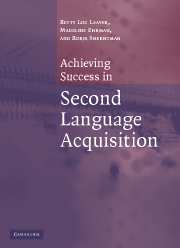Book contents
- Frontmatter
- Contents
- Notes on authors
- Acknowledgments
- Note to the reader
- Part I Learning
- 1 Planning foreign-language study
- 2 Understanding the role of cognition in the learning process
- 3 Learning styles and learning strategies
- 4 Understanding feelings and personality in language learning
- 5 Interpersonal dynamics in the learning process
- Part II Language
- Part III Independence
- Epilogue: from here to there: attaining near-native proficiency
- Appendix A Answers to “practicing what you have learned”
- Appendix B Learning strategies taxonomies
- References
- Index
1 - Planning foreign-language study
Published online by Cambridge University Press: 12 November 2009
- Frontmatter
- Contents
- Notes on authors
- Acknowledgments
- Note to the reader
- Part I Learning
- 1 Planning foreign-language study
- 2 Understanding the role of cognition in the learning process
- 3 Learning styles and learning strategies
- 4 Understanding feelings and personality in language learning
- 5 Interpersonal dynamics in the learning process
- Part II Language
- Part III Independence
- Epilogue: from here to there: attaining near-native proficiency
- Appendix A Answers to “practicing what you have learned”
- Appendix B Learning strategies taxonomies
- References
- Index
Summary
Preview
This chapter will ask you to think about a number of things that we associate with language study. With the exception of some “natural language learners,” students who succeed at language study usually plan their study in advance and check their progress along the way, fine-tuning as they go. They look at language learning not only as something that is accomplished in the classroom during a particular course, but as a lifelong activity, if not commitment, and as learning that they can work on in many places, even on their own. Some of the questions you will be asked to consider in this chapter are:
Why am I studying this foreign language? You will benefit most from language study if you orient your learning activities around your reason for studying the language. You may, of course, over time discover other reasons for continuing to study.
What is foreign language study? You probably know what a foreign language course is, in general, but have you thought of foreign language study in terms that go beyond the classroom and the textbook?
How is studying a language as an adult different from studying it as a child? You may find that your experiences in your school classes differ quite radically from your university experiences. Some of that is because of educational level. There are other reasons, too, including, for example, the fact that in many ways adults learn differently from children.
How should I plan my language study for this course? This is a very important question, because planning is often at the root of your success. Poor planning results in efforts that – while not wasted – could have been put to better use.
[…]
- Type
- Chapter
- Information
- Achieving Success in Second Language Acquisition , pp. 3 - 37Publisher: Cambridge University PressPrint publication year: 2005



